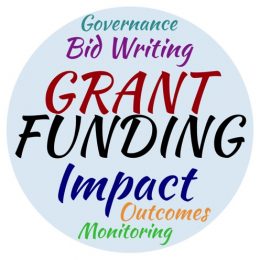 As we continue to establish some solid foundations when fund raising, we will consider some more aspects of your grant application as seen through the eyes of the potential funder.
As we continue to establish some solid foundations when fund raising, we will consider some more aspects of your grant application as seen through the eyes of the potential funder.
5. Financial Management – Demonstrating good governance
- Make sure your end of year accounts have a narrative in the trustees’ report section that
 endorses your application. It should detail community activities you have previously or are currently undertaking and highlight plans for the future.
endorses your application. It should detail community activities you have previously or are currently undertaking and highlight plans for the future. - Ensure your accounts are filed on time and are not currently overdue with the Charity Commission or Companies House. If outstanding, this will cast doubt on your charity governance and therefore your ability to manage external funding.
- Your Reserves Policy is important and funders may ask to see it. It needs to explain the amount of money you plan to set aside and your reason for that decision. 3 – 6 months of annual expenditure is normal, to ensure your charity can carry on through cash flow dips or meet its contractual obligations if it needs to close. If your reserves are a lot higher than this, you will need to justify why you are holding onto the money and not spending it on what you are asking the funder to pay for!
- Some funders request a set of current Management Accounts showing how you monitor your spend against budget and how robust your financial management is.
- Public Face
- Make sure your website and social media accounts back up what you are writing in your funding applications. A funder is likely to look at all of these public sites before making a decision about your application.
- Understanding the needs in your area
- Local funders will be well aware of the general needs in your area but you still need to demonstrate a level of demand or need for your project. National funders will be less aware of needs, so it is important to describe the needs in some detail and assume no knowledge.
- Your local council will have facts and figures about your area that can be used to support funding bids.
- The National Indices of Deprivation are certainly worth trawling through. Some funders will only fund projects that are in the lowest 20% of the indices etc, so you need to know where you are positioned.
- Make sure you know what else is going on in your area and how your activities either complement or bring an appropriate level of choice.
- Partnership Working
- Consider if there would be benefit in working in partnership with other local charities or churches. Working with others rather than in isolation, is viewed very positively by most funders.
- Apply in the way they ask you to
 This may seem obvious but be sure to read everything the funder has made available to help you to match your project to their requirements, then do exactly what they ask you to do – nothing more, nothing less!
This may seem obvious but be sure to read everything the funder has made available to help you to match your project to their requirements, then do exactly what they ask you to do – nothing more, nothing less!- If what they want to fund doesn’t really match with the activity you want funding for, please contact the funder to check suitability before starting, so you don’t waste both your time and theirs.
Next time we will start looking at some grant funding aspects in a bit more detail, starting with a focus on How to Find and Approach funders.
For further information contact Julia Miller
